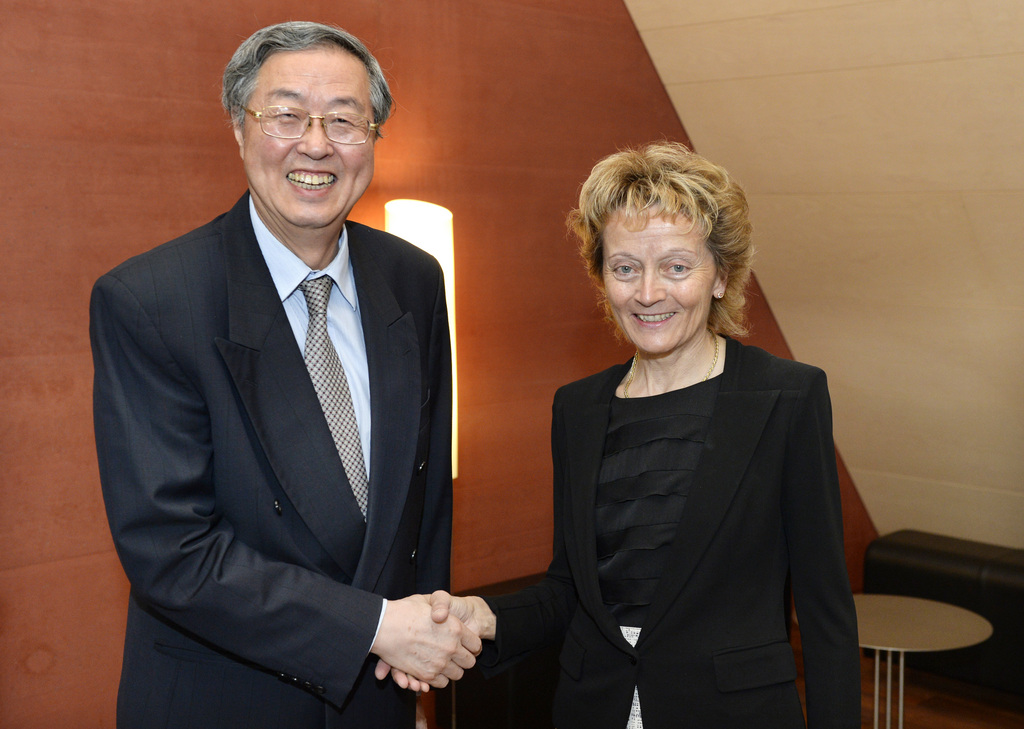Foreign banks pack their bags in Switzerland

The foreign banking sector in Switzerland has been hit by a wave of dissolving or merging banks in recent years. Major players from China and Brazil are being tipped to take their place.
Numbers of foreign-owned banks in Switzerland have declined from 162 at their peak in 2009 to 121 at the end of May this year with the likes of Lloyds, ABN Amro, Santander and ING packing their bags.
The trend continued in July with the Israeli-owned Bank Leumi agreeing to sell to Julius Baer and Portugal’s Espirito Santo private bank also announcing a change of hands. In addition, British-based Standard Chartered is looking for a buyer for its Swiss operations.
The headline figure for the falling number of foreign-owned banks in Switzerland also does not take into account several overseas-run operations that are slimming down their Swiss activities, such as HSBC that is selling CHF10 billion ($11 billion) of its client assets.
The Association of Foreign Banks in Switzerland (AFBS) is hoping that banks from Brazil, China and Singapore will fill some of the gaps left by departing players from the United States and Europe. And early signs are starting to emerge to back up this prediction.
Brazil’s Safra group, that bought Sarasin bank from its Dutch owners in 2011, agreed a deal in April to take over the Swiss-based private banking operations of United States giant Morgan Stanley. And in July BTG Pactual, also headquartered in Brazil, announced the takeover of the Italian-owned BSI private banking operation.
“We also hear rumours of Chinese and Singaporean banks making plans to come here” Martin Maurer, AFBS secretary-general, told swissinfo.ch. “Some banks in emerging economies have now reached the size that allows them to expand into new markets. Switzerland is an attractive place for those that want to diversify their operations into private banking.”
Doubts remain
Speculation of Chinese banks arriving were given further impetus by the recent renminbi swap agreement agreed between Switzerland and China’s central banks. The next step towards Switzerland’s ambitions of becoming a renminbi trading hub would be the establishment of a Chinese bank on Swiss soil.
But Martin Schilling, director of financial services at PricewaterhouseCoopers Switzerland, believes there will be more casualties in the ranks of foreign-owned entities.
The consolidation of foreign-owned banks in Switzerland has run at a faster pace than that observed among domestic players, he said.
“All the talk was about a big wave of consolidation in the Swiss banking sector, but this has not really been the case,” Schilling told swissinfo.ch. “By far the biggest reduction has come from foreign banks, a grouping that has lived up to predictions. There could well be further transactions [mergers or buyouts] in the coming weeks, months and years.”

More
Bank it
Foreign hardships
Foreign-owned banks in Switzerland appear to be particularly affected by these adverse conditions. Some have simply paid the price of using banking secrecy to provide a home-from-home vault in Switzerland for the undeclared assets of offshore tax cheats.
Leumi’s Zurich branch is one of around 14 banks to have been placed under active criminal investigation by the United States Department of Justice for allegedly aiding tax dodgers.
Other banks have been forced to sell-up by adverse trading conditions that have sucked away profits. Espirito Santo appears to be caught between two stools, reeling both from poor results and the arrest of its former boss Ricardo Espírito Santo Silva Salgado in Portugal as part of a tax evasion probe.
But the main reason so many foreign-owned banks are axing or downsizing in Switzerland is that their Swiss operations represent only a small, niche part of the group’s business operations, according to Martin Schilling.
“With regulatory and economic pressures building up, some international banking groups have decided to shed parts of their portfolio not viewed as core operations,” he told swissinfo.ch.
Changing landscape
The global financial crisis forced all banks to retrench and re-evaluate their strategies. Faced with falling profits (and often sizeable losses) and demands from regulators to better control risk with greater capital reserves, many multinationals were obliged to slice off far-flung parts of their business that did not bring in enough revenues to justify their continued existence.
Added to the potential legal and reputational hazards of tax evasion probes, some executives have viewed their small private banking offices in Switzerland as even less affordable unaffordable luxuries.
But Martin Maurer is convinced that the foreign bank sector in Switzerland will eventually stabilise and begin the flourish again in future.
“If you look at the trend of consolidation over the last two years you might come to the conclusion that there will be no foreign banks in Switzerland in five years’ time, but this simply will not be the case,” he told swissinfo.ch.
“There will certainly be fewer foreign banks than in the past but they will be bigger and from different geographies.”
The small pocket of Arab-backed banks in Switzerland have bucked the trend of foreign banks closing or downsizing their Swiss operations.
Of the 10 Swiss affiliates of Arabic banking groups operational when the 2008 financial crisis hit, only the Bahrain-backed Faisal Private Bank in Geneva closed down four years later after an ill-fated foray into US and eastern European real estate. Indeed, the Abu Dhabi-owned Falcon Private Bank, headquartered in Zurich, has been busy expanding by hoovering up assets from Hyposwiss Bank and buying the European operations of Clariden Leu from Credit Suisse.
Arab-backed Swiss banks – that concentrate chiefly on wealth management – have been unaffected by tax evasion scandals that have either touched other banks directly or have reason to cause others concern, according to Swiss-based Arabic bank consultant Nasri Mulhamé. “Arabic clients are not here to avoid taxes as tax rates are usually very low or non-existent in their home countries,” the former chief executive of the Geneva-based Arab Bank told swissinfo.ch. “They come primarily to take advantage of Switzerland’s political stability. If you are looking for a safe haven for your assets during periods of uncertainty then Switzerland remains the number one destination.”
In addition, Geneva has traditionally acted as a favourite destination for wealthy Arabs, given its French language, high standards of living and its growing importance as a commodity trading hub. The trend started in the 1970s when oil started flowing in the Middle East, but the region did not have a very advanced banking system.

In compliance with the JTI standards
More: SWI swissinfo.ch certified by the Journalism Trust Initiative













You can find an overview of ongoing debates with our journalists here . Please join us!
If you want to start a conversation about a topic raised in this article or want to report factual errors, email us at english@swissinfo.ch.